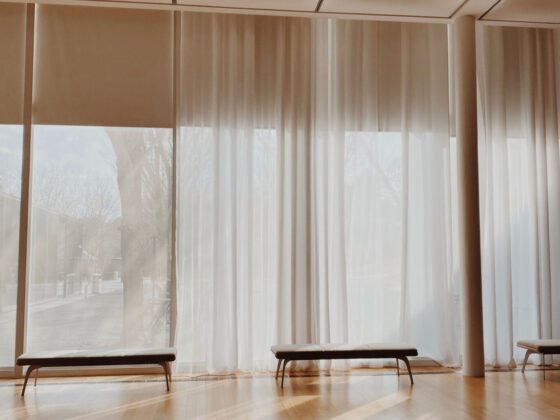“One question,” he plops down a big stack of paperwork on her desk. “My parents won’t see these forms, will they?” I cannot hear the receptionist, but the stout teenager thanks her, tugs on his hat, and leaves empty handed. As he walks out, he holds the heavy door for the next client/patient—I never know what to call them.
Us.
A woman in her eighties with a full-length fur coat steps inside. Just after her, a guy with a tattoo on his bald head clears his throat and gets in line. Slouching in a chair just a few feet away is a thirty-something man with a groomed beard and a college hoodie. I imagine him a decade ago with a large, orange “A” on his chest, yelling hard from the front row of a championship game. Across the coffee table from him, is a woman who screams “mom” without saying a word. She’s arranging rides, organizing the calendar, and putting things in order as she politely responds to the millions of texts about the zillions of details that come at her, rapid fire, all day long. I know because that’s what I do all day. She’s cleaning up what she can while waiting for her teen to finish his appointment. Not too many years ago, that boy was cooing and giggling and learning to walk, and she can’t help but wonder what happened. She continues to put things in order on her phone, which almost always does what she asks.
The waiting room is awash with sky and sage: calming, peaceful. Sunlight streams through south-facing windows just enough to cheer, but not so much as to overwhelm. There’s a mantle on the wall, but no fireplace behind it.
Each time footsteps come down the hall, we all look up, listening for the counselor with the invisible halo to call our names. We all know where we are cracked, for the most part. We need and want total healing, or at the very least, some objective wisdom to get us through twenty-four more hours.
EarPods, phones, and books build walls. Nobody makes eye contact. We all remain in our broken bubbles, pretending we don’t see or know each other—pretending we’re all alright. But our out-of-pocket receipts betray us. The way our breath catches in unison when a therapist appears in the doorway sells us out. This furniture, which should feel comfortable—relaxing even—but never feels anything but awkward tells our stories for us.
Being broken won’t ever feel natural. We weren’t originally intended to live like this—all messed up in this shattered world. But there is good news for the hoodie guy, the mom on her phone, and for me.
This world won’t always be broken, and that’s the real news we are all desperate to hear.
Then I saw a new heaven and a new earth, for the first heaven and the first earth had passed away, and the sea was no more. And I saw the holy city, new Jerusalem, coming down out of heaven from God, prepared as a bride adorned for her husband. And I heard a loud voice from the throne saying, “Behold, the dwelling place of God is with man. He will dwell with them, and they will be his people, and God himself will be with them as their God. He will wipe away every tear from their eyes, and death shall be no more, neither shall there be mourning, nor crying, nor pain anymore, for the former things have passed away.”
Revelation 21:1-4
Revelation 21:1-4 tells us that there will come a day for followers of Christ when all the sad things will be reversed . All the broken hearts will be mended. All the illnesses will be healed. All the traumas will be undone. There will come a day when God himself will wipe away every tear from our terribly sad eyes. What a word—every! All the pain that brings all the people to all the waiting rooms will be gone because God has promised to make all things new, and he’ll get a running start by mopping up our tears. Every last salty one.
While I find myself looking to my counselor for wisdom on how to live life, I can sincerely report that my soul is already at peace. Here’s why: Because I’m so very far from perfect, and because God is totally perfect, only blood—mine or someone else’s—can bridge the gap between us. Hebrews 9:22 says, “Without the shedding of blood there is no forgiveness of sins.” Since Jesus died—which means he most certainly shed his own blood—and rose from the dead, he has offered all of humanity eternal life by paying the debt we owe. I’ve put my trust in him, and his grace and mercy have bridged the gap between God and I for all of eternity. We are all putting our trust in something, aren’t we? Maybe our money or our significant other. Maybe our gender or our sexuality. Maybe our reach, profession, or position in our family. Maybe our athleticism or winsome way with people.
I have lots of those things, but it’s easy for me to see at any funeral that none of that fits into the casket. When I look at this grand earth, the sky beyond it, and the depths of my own human heart, there’s just too much that supports the idea that the moment after I take my last breath here, I will take my first somewhere else. Even as I sit at the counselor’s office looking for help on my particular situation and my own jagged contribution to it, I can testify that I have been given life and peace now, and something stunningly fabulous to look forward to later.
Because Jesus has redeemed my life from the pit (parts of it created by me, and parts of it are the way of the world), I will live forever with him in heaven—a place where there is no abuse, no disease, no political parties, and where the sounds of children playing happily in the streets will ring through the air. It’s where there is no cancer and no divorce, no debt and no death, no disease and no broken relationships. It’s a place where there are no police or fire stations, no hospitals or pharmacies, no old folks’ homes or prisons. No tears at all, actually.
Thanks be to God, it is a place where there is not one, single waiting room as far as the eye can see.
And beyond.
Reflection and Application
- Are there places of brokenness in my own life where some wise counsel would be beneficial?
- What is keeping me from pursuing help through a counselor or older, trusted individual?
- In addition to God wiping away our tears, David says in Psalm 56:8, “You have kept count of my tossings; put my tears in your bottle.” When I’m crying, do I ever think about the fact that God is keeping track of my tears even now? He cares when I cry. Is that something I ever think to thank him for?
Candace and her husband Jim enjoy raising their five children in Tennessee. She has written a children's book calledJosephine and the Quarantineabout how God cares for us in times of loneliness through puppies. Candace also writes a weekly column for theDaily Memphianand for publications likeThe Gospel CoalitionandRisen Motherhood. She dreams of having her own writing cottage in Oxford someday (England is the dream, but Mississippi's not bad either). You can find Candace on Instagram @candaceecholswrites or on her website atcandaceechols.com.






